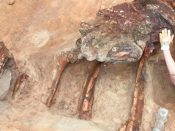By Bruno J. Ens (Sovon, Dutch Centre for Field Ornithology, The Netherlands).
Because I failed to convince my scientific mentor, the late Rudi Drent, that fiddler crabs were the ideal study species, my scientific career has become tightly linked to the study of career decisions and competition among shorebirds, most notably the Oystercatcher. Supervised by John Goss-Custard and John Krebs, I stud-ied interference among Oystercatchers during the nonbreeding season in the estuary of the Exe, UK. In 1992, I finished my PhD thesis “The Social Prisoner: causes and consequences of variation in reproductive success of the Oystercatcher” at the University of Groningen in the Netherlands under the supervision of Rudi Drent. I then moved to the Dutch island Texel to join the Research Institute for Nature Management (RIN), headed by Wim Wolff, to study the impact of climate change on shorebird populations. Due to fusions and privatization, the name of the institute changed from RIN to IBN-DLO to Alterra to IMARES. Throughout this period, I was involved in applied ecology, studying human impacts, like shellfish fishery, soil subsidence due to gas extraction, disturbance, climate change etc. on shorebird populations. Because I strongly believe that the dynamics of populations must be understood from the behaviour of individuals, I also remained heavily committed to keep the Oystercatcher population study on Schiermonnikoog running. In 2006, I moved to Sovon Dutch Centre for Field Ornithology, which is dedicated to organizing bird monitoring by large networks of volunteers, i.e. citizen science. In 2008, I started to encourage groups of volunteers to initi-ate colourmarking populations of Oystercatchers throughout the Netherlands. At present, I am engaged in major projects to restore mussel beds in the Dutch Wadden Sea, developing an integrated monitoring network for this unique area, recently assigned as a world heritage site, and a large-scale study to find out how we can halt the dramatic decline of the Oystercatcher in the Netherlands www.chirpscholekster.nl. Occasionally, I sneak off to tropical countries to study the risk-taking behaviour of crabs.



















